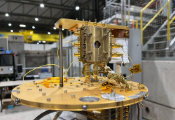BQP Demonstrates Possibility of Large-Scale Fluid Dynamic Simulations With Quantum Computing
September 12, 2024 -- BQP, a startup leading the development of quantum-based engineering simulations, today announced a significant research milestone for simulating Computational Fluid Dynamics (CFD). The milestone was achieved using a hybrid quantum-classical solver, which is part of BQP’s next-gen simulation platform, BQPhy.
After conducting approximately 100,000 experiments, BQP researchers published their work in a paper where they estimated that large-scale CFD simulation of a jet engine can be achieved with only 30 logical qubits on a quantum computer, leading to better accuracy, efficiency, and costs than current methods. A prior study, which inspired the BQP team to undertake this research, found that it required 19.2 million compute cores to perform this same simulation with classical algorithms on state-of-the-art High-Performance Computers (HPCs).
“This study is pivotal as it would democratize large-scale CFD simulation for every engineer once quantum computers become utility-scale,” said Abhishek Chopra, founder, CEO, and Chief Scientific Officer at BQP. “In the future, what would engineers have easier access to – 19.2 million HPC cores or 30-logical-qubit quantum computers? I bet on the latter.”
For the research, BQP scientists estimated sociability, accuracy, and consistency for jet engine simulations using BQP’s Hybrid Quantum Classical Finite Method (HQCFM) solver. The study demonstrated the scalability of the HQCFM solver by simulating a non-linear, time-dependent Partial Differential Equation (PDE) from 4 qubits to 11 qubits.
Researchers found that accuracy and consistency were comparable to classical computers, while the HQCFM distinguished itself by running inside a time loop in a transient problem, without propagating any error to the next time step. Obtaining such high accuracy consistently is a significant breakthrough toward more complex simulations beyond the capacity of classical devices.
BQPhy’s physics-based solver can also be used to solve other PDEs to capture interactions in gas dynamics, traffic flow, or flood waves in rivers. Combined with quantum algorithms, the technology can solve complex equations with reduced hardware demands compared to traditional high-performance computing (HPC) methods, while enabling sophisticated and intricate simulations to be performed effectively.




































